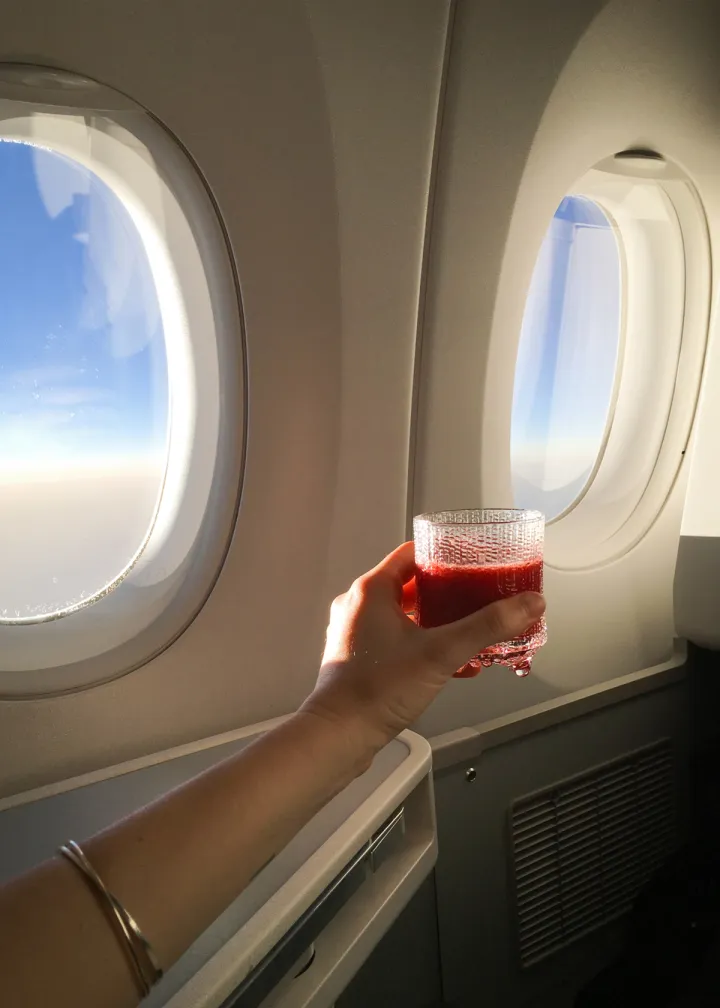
What to Eat on a Long-Haul Flight
Keep your tummy healthy and happy before, during, and after your plane trip.
Travelling is one of life's greatest pleasures. The excitement about getting to your destination for a holiday is unbeatable. But one of the downsides to travel is the long-haul flights. They're tiring, uncomfortable, and can cause tummy issues.
There are a few reasons why your digestion might be affected by plane travel:
- The cabin pressure is typically lower than sea-level pressure, which can cause gases in your body to expand.
- Sitting in a confined space for an extended period can also slow down your digestion.
- Low humidity levels can lead to dehydration which can cause discomfort and impact your ability to properly digest food.
- The food served on the flight might be quite different from what you're used to.
For these reasons, it's a good idea to pay extra attention to the foods you eat to help prevent digestive issues from happening. If you’re lucky enough to be jet-setting around the globe anytime soon and don't want to eat the food on board, here are my recommendations for healthy foods to eat.
What to eat before boarding a flight
This one will depend on your boarding time, but in general, we want to include a nourishing meal before boarding a long-haul flight. Including a balanced meal before your flight will help to manage appetite, help with sleep (if it’s a later flight), and be of particular importance if the meal and snack options on the plane aren’t things you enjoy. For a balanced meal, we want something containing:
- Protein: including a protein source such as chicken, fish, legumes, tofu, eggs, milk or yoghurt will help with managing appetite and keeping you satisfied on your flight.
- Quality carbohydrate: ensuring you include a serve of quality carbohydrate such as wholegrain bread, rolled oats, seeded crispbreads, brown/black rice, quinoa, potato or pulse pasta will help support energy levels during your flight (particularly important if you plan to do any work) and promote quality sleep when it’s time for a snooze. They’ll also help reduce irritability, which can be common when sitting for 20+ hours.
- Healthy fats: incorporating a serve of healthy fats with your pre-flight meal such as avocado, extra virgin olive oil, olives, nuts, seeds, tahini, or salmon will help keep you satisfied on your flight.
- Colour: including some colour (i.e. your fruit and veg!) is important for your pre-flight meal. They’re an important source of fibre, which will help to manage appetite as well as keep your bowels regular (no one wants diarrhoea or constipation on a long-haul flight!).
What to eat on the plane
During your flight, you’ll want your meals to contain similar options to the above. If you’ve ever eaten plane food, you’ll know this isn’t always possible. Often what is lacking in plane meals is the colour/fibre component that is going to keep your appetite satisfied and your gut happy. Snack options are also often a bit low for both protein and fibre. Taking a mix of higher fibre, higher protein snack options is a great way to help manage this. Some of our favourites to include in your carry-on are:
- Protein bar.
- Trail mix of nuts, seeds and a bit of dried fruit.
- Nut/seed bites such as the Munch Me variety.
- Roasted chickpeas/fava beans.
- Seeded crackers.
- Sealed container with veggie sticks and cherry tomatoes.
- Whole fruit such as an apple or banana.
What to eat after the flight
Similar to before a flight, your meal will depend on what time you land at your destination and what you have available. Typically sleep quality on a long-haul flight isn’t the best, meaning you’ll likely land feeling quite tired. Poor quality sleep results in increased levels of ghrelin (hunger hormone) and decreased levels of leptin (satiety hormone), meaning you may feel hungrier than usual. Choosing a well-balanced meal with the components mentioned earlier is ideal for post-flight.
I always think it is best to choose some local cuisine, whilst still incorporating the principles outlined earlier; plenty of fresh produce, good quality protein and remember to keep up your water intake. Either ask your hotel (or google) where the local farmers' markets are to find some delicious, great quality local produce.
Don’t forget to hydrate!
One of the most important things to consume before, during, and after your flight is plenty of water! Airplane cabins have very low humidity levels, which can lead to dehydration and skin dryness. Research shows we require approximately 1 cup (250ml) per hour to stay adequately hydrated during a long-haul flight. Staying well hydrated will help support your gut to function normally, optimise energy levels, manage skin hydration, and manage your appetite during your flight. Make the most of the water provided by cabin crew and avoid alcohol which will further dehydrate you.
Chloe McLeod is a dietitian and the director of Verde Nutrition Co. Follow her at @verdenutritionco and @chloe_mcleod_dietitian
Enjoyed This?
Discover more travel tips.










